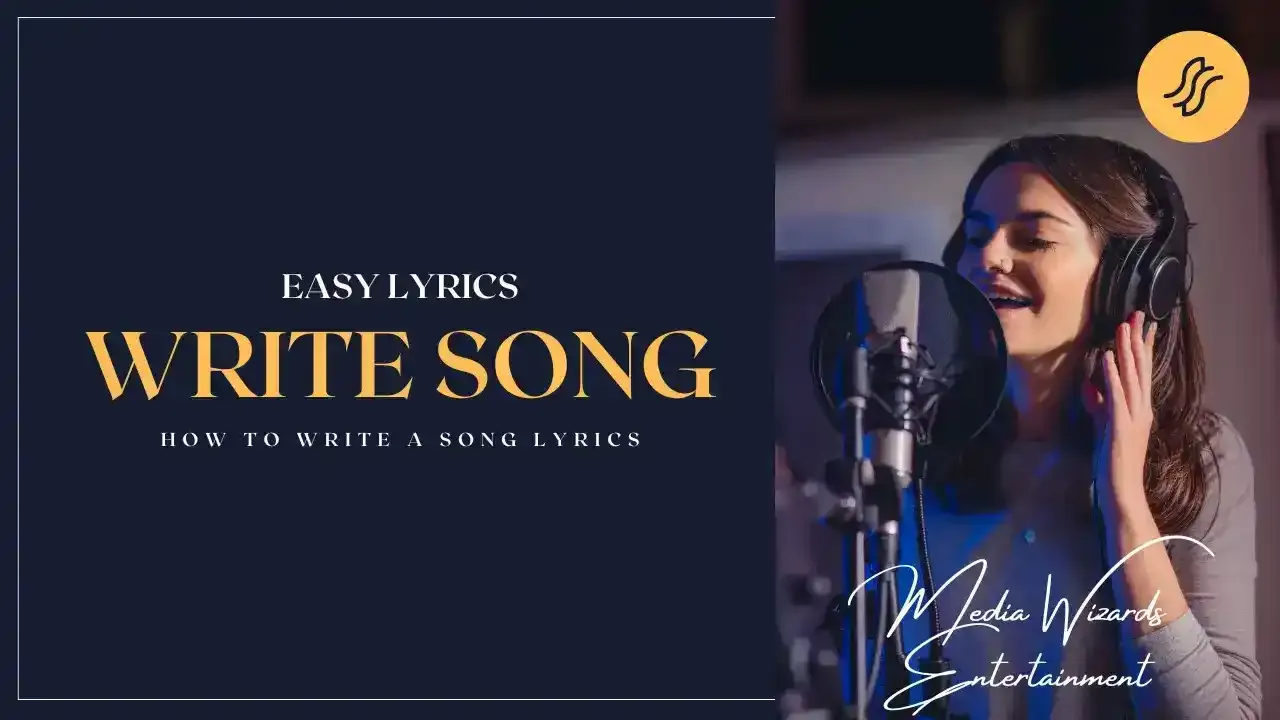Writing songs can be enjoyable and rewarding. It lets you express your feelings and share your thoughts. It also helps you connect with people. Follow these guidelines on how to write a song.
Whether you are a newcomer to songwriting or someone looking to improve their skills, this is for you!
To start writing a song, find inspiration. Inspiration can come from anywhere, whether based on your life experiences or something else entirely.
So, take a little time to think of what you might want to try to say through your song.
Do you feel it should make the audience sad, happy, or nostalgic?
 |
| How to Write a Song: Finding Inspiration |
Write down any ideas, phrases, and also feelings that ring a bell for you. This brainstorming will become the foundation of your lyrics and also melody. Because it will help you write an effective song that will attract the attention of your target audience.
Why write a song?
Let's first look at why you would want to write a song. Here are some important reasons:- Self-Expression: Songwriting is a way of relaying your emotions and thoughts. Whether they are joyful, sad, or reflective.
- Creativity: enables you to think outside the box and discover fresh ideas and concepts.
- Connection: It provides a conduit for relating to other people through our music and everyday happenings and feelings.
- Fun: It can be a terrific pastime or even a profession; it provides creativity and a chance to entertain.
- Therapeutic Benefits: It can provide an outlet for an individual's emotions, a stress reliever, and a means of expressing emotions.
 |
| Why Write a Song? Exploring Key Reasons |
Steps on How to Write a Song
Find your inspiration.
How does one begin to write a song? All one needs is inspiration. Inspiration can come from a vast array of things:- Life Experiences: Write about your experiences—happy, sad, dramatic, whatever.
- Nature: Watch nature's beauty and draw inspiration from it, whether it's a sunset, a storm, or a peaceful forest.
- Books and Movies: You can draw your favourite book or movie stories. Consider what it is in those themes that resonate with you.
- Art and Photography: Visually creative works can even inspire new ideas and emotions. So, visit an art gallery or explore online galleries for ideas.
- Other Songs: Listen to inspiring music and try to learn it. Focus on song, melody, sound, and musical arrangement. Model.
How to Write a Song: Choose a Theme or Topic
Once you've got some idea, pick a theme or topic to which you want to write your song. Here are some ideas:- Love: a love story, unrequited love, joy of being in love.
- Friendship: The relationship you have with friends, loyalty, and the pain of losing a friend.
- Overcoming Struggles: challenges you've faced and overcome because they are like battles with self-doubt or external obstacles.
- Happiness: Moments that bring you joy, celebrate success, and cherish small pleasures.
- Social Issues: Climate change, equality, mental health, and personal freedom are becoming increasingly important today.
- Personal Growth: involves self-improvement, healing, or discovery.
 |
| How to Write a Song: Choose a Theme or Topic |
How to Write a Song: Create a Catchy Hook
The hook is probably the most critical element of your song—it's catchy. That's what people remember. Here's how to do it:- Make it short: Keep it simple. Just use 4 to 8 words. It's simple to remember.
- Use Repetition: Repeat the hook. You repeat the exact words or phrases in rhythm.
- Emotional Impact: It should have emotional weight. That is why the best hooks make people feel something.
- Rhyme: Rhyming words make the hook more memorable and catchier. Consider the sounds that resonate.
Catchy Hook Example
Write The Lyrics
Write down your song's lyrics now. Here are some tips for writing a super lyrical song:- Use Simple Words: Be clear and explicit while you express your thoughts. Refrain from using complex vocabulary that will confuse your listeners.
- Tell a Story: Create a story with a beginning, middle, and end. For example, start with how you initially felt, what happened, and how it ended.
- Imagery: Use your words to paint a picture. Use metaphors and similes. So this allows the listener to see the story being written.
- Be Honest: Write from the heart. Make the world listen to honest feelings. Authenticity is what rings in listeners' ears.
- Structure Your Lyrics: Use verses to tell the story and music to convey the main idea. Consider using a pre-chorus to transition to the chorus.
Example lyric structure:
- Verse 1: It presents the narration or theme. For instance, "As I strolled along a lonely road, your monument appeared, filling me with sadness and unease."
- Chorus: The main idea of a song, sometimes used as an introduction or something that wraps things up. (Love is in the air, and I won't let it pass me by.)
- Verse 2: It expands on the narration or its details. "Every street reveals your laughter; I wish you’d hang around a little longer."
- Chorus: repetition of the main idea to make it sink into the hearts.Love is firmly established; I won’t let it slip away..
How to Write a Song: Structure Your Song
Most songs follow a specific structure. Here’s a common format:
| Section | Description |
|---|---|
| Verse 1 | Introduces the story or theme |
| Chorus | Main concept and catchy hook |
| Verse 2 | Further develops the story |
| Chorus | Repeats the main idea |
| Bridge | A different perspective or change |
| Chorus | The hook's final repetition |
Common Song Forms
- Verse-Chorus Form: Alternating verses and choruses. Frequently used in pop music.
- AABA Form: Two verses (A), a bridge (B), and a final verse (A). Traditional songwriting.
- Verse-Pre-Chorus Form: Before the chorus, the pre-chorus builds tension.
Choose a melody
Melody is the tune to your song. Here's how to build a melody:- Streamline: Use simple notes that are straightforward to sing. Begin with just a few notes.
- Experiment: Guess some notes until you get something that sounds to fit. Experiment with your instrument and vocals, or try out different versions.
- Match the mood: Your melody should harmonize with the tone of your words. Besides, if your song is sad, use a slower melody; if it's happy, use something upbeat.


Tips for Creating Melody:
- Use a Piano or Guitar: These make excellent instruments to play with your melodies. Start experimenting with chords and see what appeals to you.
- Sing Along: Keep experimenting with your melody, and hum the line of your lyrics to hear how it is playing so far.
- Record Your Ideas: Use your phone or a recorder to catch ideas for melodies as they hit you. You can get more precise later.
How to Write a Song: Adding Chords
Chords will add depth and richness to your song. Here's how to determine chords:- Basic Chords: Use simple chords like C, G, Am, and F. These are the most used chords in popular songs.
- Try out progressions: Try some different chord progressions. And then see where they fit best. It is a combination of I-IV-V or C-F-G.
- Follow the rhythm: The chords need to fit the music. So, play along to find what sounds best.
| Progression | Description |
|---|---|
| I-IV-V-C-F-G | Happy and upbeat |
| I-V-vi-IV | Many pop songs are popular. |
| ii-V-I | The standard jazz progression |
| vi-IV-I-V | Emotional and catchy |
Write the bridge
The bridge separates the song from its lyrics and delivery. Follow this process to write a bridge:- Melody Changer: To make it stand out, use a different melody. It should evoke a different feeling between the poem and the chorus.
- Shift the lyrics: Bring forward a new perspective or emotion. It might reflect on all you have sung so far or an utterly contrasting feeling. It should be short—typically, 4 to 8 lines work well.
Example of a Bridge:
How to Write a Song: Editing and Revising
Now comes the editing and revising. Here's how to do that.
- Read it aloud: To see how it sounds, read it out loud. That will also help you pick up on awkward phrases and improve the flow.
- Get Feedback: Share your song with friends or family to get their thoughts. They may offer you valuable insights or suggestions.
- Make Changes: Be bold and change words or lines that don't fit. Songwriting also involves arranging.
Editing Tips
- Get Away: Put your song aside for at least a Day or two, then return to it with fresh ears.
- Keep Flowing: Your words should seem to flow. Every line should be able to feed into the next one.
- Clarity: Your message should make sense. That is why you should not use terms that may be ambiguous.
Practice, practice, practice.
When you are satisfied with your song, practice it! Here are some tips:- Perform: Sing it out loud and play chords on your instrument. Then, you get accustomed to the song.
- Record Yourself: Use your phone or computer to record your internship. Furthermore, listening back may help you catch areas that need improvement.
- Play for Others: You can also share your song with friends family members, or even at some open mic nights. Performing will help you build up confidence and receive feedback.
 |
| How to Write a Song: Practice, Practice, Practice |
How to Write a Song: Analyzing Popular Music
Studying popular songs is one of the ways you can improve your songwriting. Here is how:- Listen well: What is essential is the lyrical content, music and structure of the song.
- Identify Patterns: Common themes, hooks, and chord progressions used by notable songwriters are to be noted.
Final Thoughts
Writing a song is sometimes the journey toward creativity and self-expression. Enjoy the process; have fun! Everyone has a unique voice and story to share, so embrace yours!
Be patient and practice writing a song inspired by your emotions in your style. On the other hand, continue writing, continue to experiment, and never stop making music!
FAQs on How to Write a Song
Q. How do I start writing a song?
Q. Do I have to know music theory to write a song?
Q. Why is a song catchy?
Q. How long should a song be?
Q. What are some ways to create lyrics for my song?
Q. How do I ensure my song sounds professional?
Q. What is the easiest instrument to use when writing music?
Q. Do I have to play an instrument to write a song?
Q. In a song, what is the hook?
Q. How do I structure a song?
Q. Familiar chord progressions for beginners?
Q. What melody do I use in my song?
Q. How can I make my song better?
Q. Is it possible to write a song in any genre?
Q. How much do lyrics matter alongside the melody?
Q. What are some tools that can be used for song composition?
Q. How do I overcome writer's block?
Q. How do verses compare to choruses?
Q. Am I permitted to collaborate with other people in songwriting?
Q. How to Write a Song for Specific Emotions (e.g., Happy or Sad)?
Download Cookie File